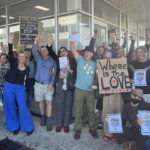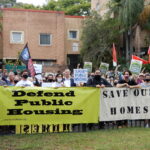Australian Government to Build Public Housing for US Soldiers, Rather than Our Own

From 2027, the US and the UK will be operating Submarine Rotational Force-West out of HMAS Stirling on Meandup-Garden Island, off the coast of Fremantle on Noongar land in Western Australia. This is to be a permanent nuclear-powered submarine (SNN) force, involving four US SSN and one from the UK, and the Albanese government plans to build public housing for their personnel.
Introduced on 24 July 2025 and passing through the lower house on 30 July 2025, the Defence Housing Australia Amendment Bill 2025 seeks to expand the operations of state enterprise Defence Housing Australia (DHA), so that it can “provide housing for foreign exchange and visiting military personnel”, as well as philanthropic organisations that provide support to ADF personnel.
The Albanese government notes that the provision of housing to foreign military personnel by the same entity that provides affordable housing to Australian Defence Force members is mainly necessitated by soon-to-be established of SRF-West, although other joint defence initiatives involving the United States, as well as Japan and Singapore, also give reason for the change.
Having skipped through the lower house, the passage of the bill hit a speed bump in the Senate, when Greens Senator David Shoebridge rose to suggest an amendment but also took a moment to call out that the last term of parliament saw federal Labor unable to “build public housing” for the Australian people, but early in its next term, it’s moving to build it for US soldiers instead.
The further kicker involved with this arrangement – if one considers that the government determining to provide public housing to US soldiers rather than Australian citizens was not enough – is that the US/UK joint SSN presence in the west will make the centrepiece of the AUKUS agreement, eight shiny Australian-owned SSN, much less necessary in terms of the coming war on China.
Making a splash for Uncle Sam
“You can’t make some stuff up in politics, but what about this?” Shoebridge said, as he rose to move an amendment to the DHA Bill on Thursday, 31 July. “In the last parliament, we saw Labor coming up with a million reasons they couldn’t do anything on public housing.”
“Then, in this parliament, they start with a public housing bill,” the Greens justice spokesperson elaborated. “Well done, Labor. You bring a public housing bill into the chamber. You push it through the lower house. And do you know what public housing they’re building? They’re building public housing for US troops under AUKUS. That’s their public housing bill.”
Shoebridge further pointed the reports of late 2023, which outlined that 700 US military personnel and their families will be stationed in WA to operate the four US SSN to be stationed in the region, along with running a low-level radioactive waste dump too planned for Meandup-Garden Island, which is progressing despite no consultation process with the Noongar people.
The Greens senator had attempted but failed to move an amendment that would have sent the bill to the Foreign Affairs, Defence and Trade Legislation Committee for inquiry, as despite the fact that federal Labor is planning on a public housing drive for noncitizens belonging to a friendly foreign military, the party has failed to consider the public taxpayer costings of this venture.
“Surely, they read this bill, didn’t they?” Shoebridge mused. “Didn’t somebody in the Labor caucus say, ‘Our first public housing bill in the new parliament can’t be to build housing for US troops under AUKUS?… And do you know what? They can’t even say how many hundreds of millions of public dollars will be used to build public housing for US troops under the bill.”
The guts of the legislation
“This bill recognises that the ADF, in modern times, relies on the support, services and cooperation of a wide range of external partners and organisations, including foreign militaries, who may require housing support in Australia,” said defence personnel minister Matt Keogh, during his 24 July 2025 second reading speech on the bill.
“In particular, this bill will directly support our requirement to house personnel coming to Australia as part of Submarine Rotational Force-West under the Australia, United Kingdom and United States trilateral security partnership-AUKUS,” he confirmed.
The Labor senator also told the chamber that 34 US military personnel will soon be arriving in WA for the commencement of SRF-West, and from then on, there will be “an increasing number of US and UK military, civilian and contractor personnel arriving in Western Australia over the course of five years, including some families accompanying United States military personnel”.
The housing needs to be close by HMAS Stirling, and it is critical for the operation of the force. But the minister warned this housing should not be of detriment to the local public, and he added that taking this DHA option is also a fortuitous route as it will ensure “adequate and suitable housing… whilst limiting any negative impacts that may be had on local housing markets”.
To facilitate these changes the legislation amends the Defence Housing Australia Act 1987 (Cth), so that its “provision of housing and housing-related services to” ADF personnel will be extended to “members of a military organisation of a foreign country”, officials and employees of foreign governments and other entities that provide goods and services to the ADF.
Claytons nuclear powered subs
Keogh also suggests that “SRF – West is integral to helping Australia and Australians develop the skills and infrastructure to safely and securely maintain, own and operate nuclear propelled submarines”.
But the minister does so in a political climate in which doubts over whether any locally owned SSN will ever be produced are pervasive. The US government is conducting a review of whether the AUKUS deal is viable. And while Britian and Australia pressed ahead with the signing of a 50-year-long AUKUS contract a fortnight ago, both the US and the UK can renege on the sub deal at any time.
While a report released last year by the US Congressional Research Service suggests that in weighing up the “potential benefits, costs, and risks” of the AUKUS deal for the US, rather than attempt to produce an extra three to five Virginia class submarines to sell second hand to Australia commencing early next decade, it would be easier for the US to run more of its own subs out of WA.
The CRS report advises that the issue is that the US has set itself the goal of producing a fleet of 66 Virginia class submarines, so it needs to be producing 2.3 of them a year in order for it to contemplate selling our nation at least three of Virginia class submarines in the 2030s, however, currently, the US production rate is at 1.3 submarines per year.
US undersecretary of defence policy Elbridge Colby is currently reviewing the AUKUS agreement on behalf of US president Donald Trump. And if he is to conclude that an alternative AUKUS Pillar I pathway, such as that recommended by the CRS, is the best route, then our government is simply pondering laws to provide housing to a permanent US submarine base to be established in the west.
“There are already two and a half thousand US marines cycling in and out of Darwin,” Shoebridge added as the Senate was about to vote not to send the public housing bill to committee, as per his amendment. “Are we building housing for the two and a half thousand marines cycling in and out of Darwin?”
“There are already plans to put 700 US troops into the surrounds of Garden Island, off Fremantle, with all their families,” the Greens senator said in ending.
“How many houses are we building for US troops in Fremantle under this bill? There’s already a housing crisis over there.”







